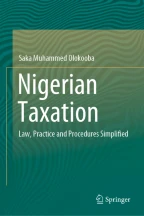
This is a preview of subscription content, log in via an institution to check access.
eBook EUR 85.59 Price includes VAT (France)
Hardcover Book EUR 105.49 Price includes VAT (France)
Tax calculation will be finalised at checkout
Purchases are for personal use only
(1927) 275 US 100. See further, Commissioner of Inland Revenue v. Challenge Corporation Ltd (1987)1 AC 155 at 167 where the court held that hidden the material fact in tax assessment form or returns from tax commissioner constitute tax evasion.
Arogundade J.A Nigerian Income Tax and Its International Dimensions (Ibadan Spectrum Books Ltd, 2005), p. 74.
Bhatia H.L Public Finance (5th ed. London Oxford University Press, 1980), p. 4. Section 26(a)(b) VAT CAP VI LFN 2004. Section 39(2) FIRS Act, 2007, See also Section 50(2)(a)(b) FIRS Act 2007.Ibid. However, disclosure of confidential information ceases to be an offence if otherwise provided by the tax law or as otherwise authorised by the Minister, or according to Section 50(3) FIRS Act 2007, as may be necessary in order to institute a prosecution, or in the course of a prosecution for any offence in relation to any tax in Nigeria.
In Section 3(2)(a)(b) thereto. Income Tax Act. Federal Inland Revenue Service Act, 2007. Section 40 FIRS Act 2007. In Section 41 (a–d). In Section 42(1)(a)(b). Section 42(3) FIRS Act, 2007. Section 43 (a–e) FIRS Act, 2007. Section 44 FIRS Act, 2007. Section 97 (a)(b) PIT Act, 2004. 95(a)(i–iv)(b) CITA, 2004. Section 45(1) FIRS Act, 2007. Section 45(2) FIRS Act, 2007. Section 46 FIRS Act, 2007. Section 49 (1)(2)(a–d) FIRS Act, 2007. Section 94(1) PITA, 2004. Section 92(1) CITA, 2004.See Section 53(7) Personal Income Tax Act (as amended by Act No 20 2011) obstruction is also an offence under Section 105 PITA.
A tax clearance certificate is a certification paper normally given by the tax authority on demand by taxpayer signifying and confirming that the holder is up to date in the payment of his tax. Obtaining a tax clearance by a taxpayer does not preclude tax authority from further checking and confirming that the taxpayer has paid the correct amount before the issuance of agreement of taxpayer account notice. If revenue disagrees with any item in the account additional assessment will be raised on the taxpayer even after the issuance of the clearance certificate. For detail distinction between tax clearance certificate and statement of agreement of taxpayer account, see, James Adebisi Ariwodola, Personal Taxation in Nigeria: Including Capital Gains Tax (4th ed. JAA Nig Ltd, Lagos, 2002), p. 157.
Section 85(7)(a)(b) PITA.The items as listed are; (a) application for Government loan for industry or business; (b) registration of motor vehicle; (c) application for firearms licence; (d) application for foreign exchange or exchange control permission to remit fund outside Nigeria; (e) application for Certificate of Occupancy; (f) application for award of contracts by Government, its agencies and registered companies; (g) application for approval of building plans; (h) application for trade licence; (i) application for transfer of real property; (j) application for import or export licence; (k) application for agent licence; (l) application for pools or gaming licence; (m) application for registration as a contractor; (n) application for distributorship; (o) confirmation of appointment by Government as chairman or member of a public board, institution, commission, company or to any other similar position made by the Government; (p) stamping of guarantor’s form for a Nigerian passport; (q) application for registration of a limited liability company or of a business name; (r) application for allocation of markets stall; (s) appointment or election into public office. (t) for change of ownership of the vehicle by the vendor; (u) application for a plot of land; (v) any other transaction as may be determined from time to time.
See Section 85(a) PITA.Section 96(1)(a)(b) PITA. A similar provision for such an offence and punishment in the case of Company is contained in Section 94(1)(a)(b) CITA.
Section 39 of VAT Act is on power to enter any premises at any time by an authorised officer without warrants once such officer has reasonable ground to believe that a person is carrying on business that necessitated an ascertainment whether VAT Act is being complied with or not in the business.
The requirement under Section 5 of VAT Act is on the required information to determine the value of taxable goods and services.